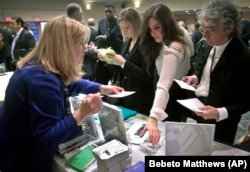A new study suggests that in the United States, college and university students must think carefully about their first jobs after graduation.
People who take a job that does not require a degree can find themselves in lower-paid positions than their educated peers even five or ten years later, researchers say.
Burning Glass Technologies and the Strada Institute for the Future of Work partnered to create the report, released in May. Burning Glass is a software company that researches the labor market. The Strada Institute is part of the Strada Education Network, a national nonprofit organization that supports the growth of education in the United States.
The study is based, in part, on data gathered from U.S. companies’ job advertisements and workers’ employment and education histories. Researchers used special software to examine advertisements listed on nearly 50,000 job search websites between 2010 and 2017. They also looked at the résumés of almost 4 million American workers dating from 2000 to 2017.
By comparing this information, researchers found that during those periods, 43 percent of U.S. college and university graduates’ first jobs did not require a bachelor’s degree. The researchers considered a job that does not use a person’s education “underemployment.”
The high percentage of underemployed college graduates may not come as surprise, says a top official at the Strada Education Network. Michelle Weise is the senior vice president of workforce strategies.
Some of the data from the study comes from a time when the U.S. economy was facing a serious recession and jobs were limited. But Weise points out that, in general, many kinds of jobs require little to no formal education. These include jobs in fields like food service or physical labor. The problem, she says, is the serious and possibly long-lasting effects of choosing such a job.
For one thing, there is a major difference in how much money underemployed and fully employed graduates are likely to make, Weise notes. The researchers’ study of U.S. government data on pay suggests that recent graduates of bachelor’s degree programs who are underemployed earn about $10,000 less, on average, than the fully employed.
Weise says the other issue is that underemployed graduates will likely be stuck in positions that do not use their education. The study showed that about two-thirds of graduates whose first jobs do not require a degree will still be underemployed five years later.
And about three-fourths of that underemployed group are likely to remain underemployed for at least another five years after that.
Both schools and students are responsible
In a way, both the students and the schools are responsible for solving this problem, Weise argues.
She says students need to be thoughtful about their career path, especially while they are still in school. The sooner they start considering the steps they need to take to help find a job after graduation the better. These steps include asking professors for advice and seeking out internships.
And Weise suggests that if they can, recent graduates should not simply accept the first job offer they receive. Having the desire to work is important, but so is waiting for a job that could lead to better positions in the future.
Field of study is also important, she says. The Strada and Burning Glass study found that graduates with degrees in science, technology, engineering or mathematics are less likely to be underemployed. And students who earn degrees in a liberal arts field, such as history, may have a harder time finding a job that uses their abilities.
But Weiss argues that colleges and universities also have to do better to support liberal arts graduates in their job search.
“Something we have struggled with, especially since the Great Recession, is that we are not great at translating what those … skills are that students are developing in those liberal arts programs and how they translate into the workforce,” Weise told VOA. “We’re not good at showing our students, before they go on the market, how … marketable they really are.”
Developing a number of skills
Another expert points out that underemployment is also connected to how higher education operates in the modern world. Peter Cappelli is a professor of management at the Wharton School of the University of Pennsylvania. He says asking students to start preparing earlier to enter the workforce is only part of the solution.
“We’re telling them, ‘Pick your career when you’re 17 and you’re applying to college,’ Cappelli said. “And then if you happen to pick the wrong one and you graduate and there’s no demand there, you’re out of luck. Or you could get a very practical degree that helps get you an immediate job, but you haven’t learned anything that will help you later in your career.”
Cappelli notes that in recent years colleges and universities have worked hard to make higher education available to more people. But as the number of degree-holders nationwide has increased, graduates may find it harder to make themselves appear more desirable than others with a similar degree.
Also, employers have increasingly come to expect more from graduates, somewhat unfairly, Cappelli says. For example, many advertisements for positions that normally would be perfect for recent graduates now ask for years of experience.
Cappelli says that, to make themselves more competitive, college students can seek to gain skills outside of their normal study program. For example, liberal arts students might consider taking classes in computer programming during the summer break. And all workers should continue to seek ways to improve and expand their skills throughout their careers, he says.
Is higher education still a good investment?
The concern about underemployment may make some people wonder whether a college degree is still worthwhile. Nicole Smith says she understands why students and parents would ask that question. Smith is the chief economist for the Georgetown University Center on Education and the Workforce in Washington, D.C.
She admits that a traditional four-year degree is not the only path to a meaningful and well-paying job. And, she notes, as the cost of higher education continues to rise, families need to think carefully about the investment.
But Smith stresses that the majority of well-paying jobs in the future will require some kind of degree. She says people need to consider how higher education might help them in the end.
“We don’t want to discourage people from even stepping foot through the door or to discourage people from even thinking of that opportunity,” Smith said.
In addition, Smith says, readers need to look at reports such as the Strada and Burning Glass study with a critical eye. She notes that researchers and employers may have different ideas about the jobs recent college graduates can do. In other words, the report’s definition of “underemployment” may not be entirely correct.
Also, Smith argues many recent graduates choose jobs that do not require a college degree so they can more deeply explore their interests and identities. This period of exploration can help them in the end by teaching them more about what they do and do not want in a career.
I’m Pete Musto. And I’m Dorothy Gundy.
Pete Musto reported this story for VOA Learning English. Kelly Jean Kelly was the editor. We want to hear from you. How common is it in your country for college or university graduates to be underemployed? Write to us in the Comments Section or on our Facebook page.
_____________________________________________________________
Quiz
____________________________________________________________
Words in This Story
graduation – n. the act of receiving a diploma or degree from a school, college, or university
peer(s) – n. a person who belongs to the same age group or social group as someone else
résumé(s) – n. a short document describing your education and work history that you give an employer when you are applying for a job
bachelor’s degree – n. a degree that is given to a student by a college or university usually after four years of study
strategies – n. careful plans or methods for achieving a particular goal usually over a long period of time
formal – adj. received in a school
internship(s) – n. a position as a student or recent graduate who works for a period of time at a job in order to get experience
translating – v. leading to something as a result
marketable – adj. wanted by buyers or employers
apply(ing) to – p.v. to ask formally for something, such as a job, admission to a school, or a loan, usually in writing
practical – adj. likely to succeed and reasonable to do or use
stress(es) – v. to give special attention to something
discourage – v. to tell or advise someone not to do something
opportunity – n. an amount of time or a situation in which something can be done









